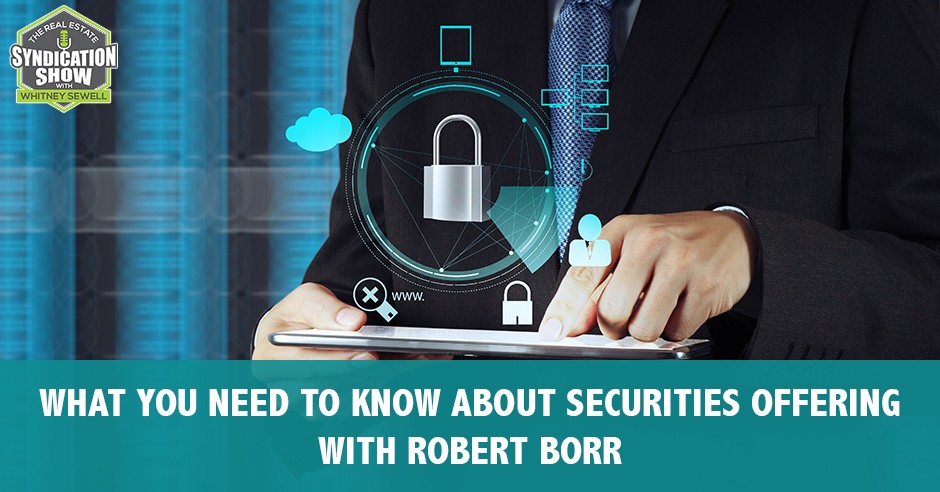Listen to the podcast here:
Robert Borr is a licensed real estate and securities attorney in the state of Florida. He is also a real estate broker, a real estate school instructor, and a title insurance agent. He educates his clients to provide a traditional in-house counsel role to those who do not need a full-time attorney or staff. Robert tackles about what people need to know about securities offerings when they’re getting into the syndication business as well as some of the common violations and pitfalls investors make. He talks about how to find inconsistencies and identify litigation risks before you make an investment decision and explains the importance of automation in real estate.
Our Gracious Sponsor:
Are you wanting to learn how to gain financial freedom through having your own syndication business? Text LEARN to 474747 to begin to learn from one of the best in the industry, Vinney Chopra. Vinney came to the US with only $7 in his pocket, and now controls hundreds of millions of dollars of real estate he has acquired through multifamily syndication. He is now personally coaching others to do the same. Text LEARN to 474747 to begin your journey to starting your own syndication business! Vinneychopra.com
—
Watch the episode here:
What You Need To Know About Securities Offering with Robert Borr
Our guest is Robert Borr. Thanks for being on the show, Robert.
Thanks, Whitney.
Robert is a licensed real estate and securities attorney in Florida. His practice focuses on real estate matters including syndication to litigation. He is also a licensed real estate school instructor, real estate broker and title insurance agent. He educates his clients to provide a traditional in-house counsel role to those who do not need a full-time attorney on staff. Robert, thanks for being on the show. I’m looking forward to getting into the matter of securities, what that is and what people need to know about all that when they’re getting into the syndication business. Before we do that, tell the audience a little bit about who you are and how you got into this business.
I’m a quintessential real estate nerd. You heard all the licenses that I’ve gotten in instructing and things like that and that is how I fell into that syndication. I was auditing an investments class for a post-license continuing education course. It happened that there was a prominent syndication lawyer who was moving over to Florida in the classroom there. We were working in the back together and going through the workbook on some of the problems. She looked over and she said, “You might make a good securities attorney.” I said, “Do I get a gun? What is that?” She explained her business to me and the part that she did in real estate. It was fascinating to me because I’d seen these investment models before. I’d seen a lot of things done wrong. Things that are called joint ventures or things that are called what you will, but they end up being securities.
It’s an interesting niche area of law because once I got into it and I started doing contract work with her firm. I came to find that there were a lot of cases where it falls into the definition of security and attorneys don’t know that. Even investors don’t know that, especially in these local REIAs. They’re selling a joint venture packet. Let me show you how to use my form to raise private money. I’d go sit in these seminars as they are and cringe when I’d see things go up on the screen. Ever politely, I try to talk to the presenter afterward and say, “You might want to check out this book or you might want to get a little bit more education because I don’t think what you’re doing is necessarily on the up-and-up.” That’s the story of me walking through the securities because I don’t set up funds.
I have a lot of funds that I’m quasi-general counsel for. What I’ve found is that sometimes they’ll get set up and the people set them up and say, “You’re good,” and they’ll provide some support. It’s not their focus at a boutique firm that does syndication startup to necessarily provide the different support in different aspects in real estate. The background I have in real estate has been helpful in making sure that we put the right risks or different risks in that somebody might not think about. I have a good idea of the numbers when I’m looking at somebody’s investment. I can say, “These numbers work,” or “They don’t work.” It’s obviously not my job to give them business advice, but I’m not going to put somebody in a situation where they’re going to fail or I think they’re going to fail.
I appreciate that. It’s helpful that you understand the numbers and that you understand the investing side of it and what that should look like to help give us some advice from your experience. You’ve seen something on the screen or you see things like that at conferences that would make you cringe. Can you give us an example?
[bctt tweet=”You don’t want somebody who you can’t communicate with or that you’re afraid to communicate with.” username=””]
I’ve seen it more on the local level than I have at one of the major player conferences that you would go to that’s focused on syndication. Typically, in these local REIAs, I’ll see somebody stand up and they’ll call themselves a transaction engineer. You need to go find private equity and I’ve got a whole form of packets and joint venture agreements and notes that you can use. I look at these things and I go, “Is this all you’re giving to your investor?” I always hear the phrase, “Other people’s money.” Let me show you how to use other people’s money. Those are investor funds. That’s what other people’s money is. An investor fund isn’t a security. Ignorance of the law is no defense.
There’s a lot of cases that I’ve been pulled on as litigation counsel where I’ve looked through and it’ll be a series of notes that someone will have given to a certain individual to work through. I go, “Do you realize this is a securities violation? This isn’t just you trying to recover on a note.” Lawyers look at me and they go, “What is that like?” It’s Chapter 517.302. It’s a felony what they did. They can go to jail for this and we can push them in that direction by properly amending the complaint and bringing it that way. It’s important for people to know what they’re doing to educate themselves and understand and comply. Even the investigators here in the state of Florida, I worked with them. I tried to get them educated and make sure that they know where to look and what to look for and file administrative complaints. I’ve done a handful of those.
I would say that it’s something that has huge ramifications if you don’t do it right. You have everybody on your show in preparation for this. They have great information. Don’t try to skirt the rules. Don’t try to come up with something clever that you think, “There’s not a comma here, so I’m going to be able to do it this way.” The definition of a sale is four pages long at the Federal law. It’s multiple slides. When I give a presentation on securities, I inevitably have a lot of upset people by the end of the presentation because they go, “What do you mean?” I’ll quote a person who said, “I get a boot full of money from my partner and his friends and then I bring them a bigger boot full of money.” I thought, “A boot full of money. That’s an interesting term.” I’m looking at that going, “No, that’s wrong.” Make sure you comply. There are different exemptions. There are ways to do it the right way and realize that when you’re raising whether it be $250,000 or $10 million, you need to comply. It’s important and you can get into trouble with this.
Your bio mentioned that you provide a traditional in-house counsel role to those who do not need a full-time attorney on staff. We talked about those that are getting started in the syndication business. Can you elaborate on maybe some of the common issues that people have when they’re first getting started in the syndication business and help us to be ready to overcome those hurdles?
There’s a difference there. There’s one when you’re starting up and then there’s another one your ongoing. To be able to continue with the ongoing support, at least in the state of Florida because this is where I’m licensed, I can consult on any real estate issue and I typically work with smart people. They don’t need to have an attorney sitting next to them and ask them every single question they need. Once I can train them a little bit to issue spot on different areas, whether it be in multifamily, you’re going to have different strategies when it comes to non-paying tenants. Maybe different types of insurance claim issues that occur, those types of things.
Once I bring them up to speed and they know how to issue spot, it becomes an easy phone call. It becomes a fifteen minute, “Let me run these by you. Is this something that you need to look at?” Many times it’s not, but they know when something could be a problem. It’s refreshing to have clients that way because what you don’t want is somebody who you can’t communicate with or that you’re afraid to communicate with. “I don’t want him to send me a huge bill. I don’t want him to ruin my day by telling me that what I’m doing is wrong or this is a bad idea.”
I hear people refer to some syndication attorneys as a no man or a yes man. We don’t want somebody that’s yes all the time either.

That’s true. I’ve worked with other looser legal compliance officers not always attorneys and their answer to everything is, “Yeah, sure. We can put that there.” They want to know specifically why they can’t as if the burden is back on me. Some of these times I simply say to them, “If you were in court and you were trying to explain this provision, you were trying to explain this situation to a judge or jury or even to opposing counsel, how do you expect that this gobbledygook is going to make any sense? You’re off far into the weeds at this point and having a fresh look on the thing is important.
That’s why we’re paying somebody like yourself to help represent us as well if something happens.
Yes. I hope never to have to go to court. Keep them out of court. You don’t need to be there. That’s the interesting part when I turned around and I started doing review work for people that were going to invest in syndications. I would start looking through other people’s PPMs and offering documents. It’s a whole different perspective as somebody who started by drafting. I’m strictly complying with what the law needs to be. Now I’m looking at other people not strictly complying. It’s the difference may be between being a plaintiff and a defendant sometimes. I go look these guys up on federal government, they’re registered. I see that they have something here, but the problem is that they’re using an exemption that doesn’t exist. They’ve got an attorney. Tell them that I’d like to talk to their attorney or ask them. What I came to find out is that there were companies that were using old forms and they were rehashing the forms. In 2014, when the laws all changed, there were still 2014 forms out there and they’re passing it on to their investors saying, “No, my attorney has reviewed all this.” Maybe he did at some point, but not anytime recently.
That’s interesting you bring this up. I haven’t had anyone talk about that as far as reviewing documents for the LP or the passive investor when they’re ready to go into a deal. Taking that PPM to somebody’s private placement or memorandum to somebody like yourself and saying, “Could you review this?” Instead of taking that sponsor’s word for it. Could you elaborate on that process a little bit for the passive investor that’s reading that says, “I didn’t even think about taking those documents to somebody like yourself, to an attorney. Is this accurate?” Can I take their word for what it should be?
It’s interesting because they run the gamut. I’ve gotten 400-page PPMs that are in archaic English that doesn’t make a lot of sense. A lot of those times, I’ll set a limit. This is all by the hour work because there’s no other fair way to do it. I’ll normally say, “In these many hours, I can tell you whether or not this is legit or they’re not.” Sometimes I’ve called and talked to people and sometimes it scares them away. As soon as I say, “My attorney would like to give you a ring,” all of a sudden, that person stops returning their phone calls and stops checking their email and they disappear. I would say a nominal fee compared to the investment that is normally being asked for, it’s a good security blanket.
I would welcome that. I would want to know what you had to say about my PPM then I’m going to talk to my attorney about it or get their take on it. It’d be great if you all could have a discussion about it.
Typically, it is. The beauty of the training that I’ve had through this is the best of the best where I’ve got my training from. I don’t want to name names, but they’re people that have been on your show. The bar is set high when looking at your document. A lot of times, when an attorney finds a good provision in somebody else’s document, they take that provision and all of a sudden, you start to see this document that’s been cobbled together and you go, “I think I know who wrote that provision. I saw that and another one.” You start to find out who’s competent and who’s not. Typically speaking, you can tell quickly if there’s a real attorney on the other side. More often than not, I’ll find that there’ll be no attorney on the other side and these guys made a document up or they got something and tried to put it together themselves. You start looking at the risks and the different languages you put in there. You can start to spot the holdovers that you might find from other documents. After you set up enough, you start to know what’s going to change, what’s not going to change every time in the documents.
[bctt tweet=”The hardest part sometimes is bringing people to the light.” username=””]
That’s a risk as part of your due diligence. It’s something that should be in your due diligence as a passive investor that I haven’t heard mentioned. I find it interesting that you brought that up. It can be important. Paying you for an hour or two of your time could be valuable if you were to say, “This wasn’t even done by an attorney,” or saying, “My attorney would like to talk to your attorney,” talking to this person you want to invest with. That could eliminate this deal for you right there and could be such a blessing that it happened.
You might want to say that to anybody that you’re going to invest with. “My attorney wants to talk to your attorney,” and see if they run.
What would be something that I could see in a PPM if I’m a passive investor looking at least 100 pages, sometimes 400? As somebody that’s not an attorney and I have read PPMs, it’s hard to do. I did educate myself. What’s something they could see maybe you could help them to raise that red flag initially to say, “This isn’t right.”
First off, look for inconsistencies between the executive summary and then what’s later on in the document. When you start to find those inconsistencies, you know that it’s sloppy drafting and it’s most likely hasn’t had a set of eyes to legalize on it. Not to say that there’s not potentially going to be a typo. I normally look at that. I look at the waterfall a lot of times and I’ll see, “Does this make sense? Is it what the investors telling me that they think that this deal is? How has that written out?” I’ll look through the risks a lot and see if it lacks any risks based on my own real estate expertise, maybe where the property is located in the country. If you’re looking through it and you go, “This is a fund that’s going to flip foreclosures. They’re going to operate all over the country and there’s nothing in there about the litigation risk and buying a bad title, perhaps getting a bad title for a foreclosure sale because you’re not necessarily going to get clear title through something like that.”
You start to go, “Is there an attorney on the other side of this?” If so, I’m going to improve his document immensely if we have a quick conversation. I see everything that needs to be in place if there’s an attorney on the other side. It’s been rare. I had one particular attorney that admittedly told me that he’s never written a security’s offering before and thought that it was a form. I said, “This isn’t your cup of tea. It can be, but this isn’t the way that you need to do it.” I want to say that’s only been once or twice.
What’s interesting to me is that there are also sponsors that I’ve run into that wants something to be a particular way that we can’t set up. The structure doesn’t work this way. They’ll keep on looking for attorneys to help them. What I tell everybody is that if you keep looking for an attorney and waving money at them, you’ll find somebody who will take it and do something, but that’s not best practices. If you have two or three people that are reputable in the industry and know what they’re talking about and saying, “No, we can’t set it up that way.” You continue to look and find the guy who got out of law school three days ago and pass the bar and you say, “I’m going to give you $25,000 to write what I want you to write.” He might do it.
I haven’t thought about it until now. As something as a passive investor, could it be as simple as asking the sponsor what attorney did you use? What attorney are using? Looking that attorney up before you even have to read the PPM, would that be maybe a good place to start?

That could be a good place to start. You might come off a bit abrasive if you come out that way and say, “Who did you use? Let me look them up and let me look at their documents.” That’s going to put a good smell test out there. The flip side is the sponsor isn’t going to want a bunch of investors calling their lawyer. I know that when I set up documents, I don’t want investors calling my office. I don’t even necessarily want their attorneys calling my office, but I will and I’ll entertain any questions that they have obviously. That’s more time. If the person who’s calling me is that family lawyer who’s friends with them for a long time, it’s my niece, cousin, daughter, dad or somebody and they don’t know anything about securities, we’re not accomplishing anything at that point.
Robert, what’s been the hardest part of the syndication business for you?
The hardest part sometimes is bringing people to the light to say, “That joint venture is security. That operating agreement that you have set up is a security.” You can’t have eight people in this agreement and these seven people do nothing and you do all the work. We look at the Howey Test and we apply it and we say, “At the end of the day if you’re the person that’s doing all the work to get the security done to generate the profit, this is most likely going to be a security.” You’re putting yourself at risk of being a felon. Is that worth it? That’s the hardest part. You think that people go, “I want to be able to borrow money from my friends and we want to pull it together.” Unless you truly are partners in this business, then you need to make sure that you qualify for an exemption. The burden of proof is going to be on you to make sure that you qualified for it and don’t blow it.
You can go to these local shops and these local meetings and someone will stand up and say, “We got an apartment building under contract and we’re looking for investors.” I’m sitting there thinking to myself, “I wonder if they have 506(c) offering set up. I wonder if they know what that is.” It will happen every time. It’ll happen at almost every REIA that I’ve gone too. Maybe that’s the bridging the gap there. We meet in Orlando. One of the REIAs meets at a local high school. We need to go from high school over to the Ritz-Carlton or wherever they were doing the real deal. Everybody is flying in to learn about syndication. Attorneys are going to talk. We’re going to talk about business and structure and do it that way.
I see that on Facebook almost every day. I don’t have to go to the local REIA for that.
That’s low hanging evidence for all the investigators because that’s what they tell me.
What’s a way from your opinion that someone can improve their syndication business?
[bctt tweet=”The internet is a double-edged sword. You can find the information that you need here, but you may or may not know if it’s accurate.” username=””]
If you’re starting out, I would say get familiar with an exemption. Get familiar with how you’re going to run your business. We would convert a lot of different types of people into syndicators who wanted to move over into it. Some people had the network, some people didn’t. The issue that people will come up to me with is they’d say, “I don’t have anything to sell. What am I supposed to offer to my investors because I don’t have anything under contract?” I always would tell them, “Under a 506(b) exemption, it’s a private placement. It’s a private deal. You’re not soliciting out to the public. 506(b) is when somebody wants to start with. I’m not going to hand them the keys to the Ferrari when they can’t ride a bike.”
Know your exemption and understand that you can use the compliance to position yourself as somebody who’s an expert or somebody who’s qualified. You can say, “This is what the law requires. I need to build that relationship with you before I can bring you into the deal and before I can even show you anything that I’ve done.” From somebody who’s getting into the business, that’s important. For somebody who’s in the business now, I would say automation. Look for ways to automate whatever it is that you are getting hung up on, whether it’s deal flow, whether it’s a CRM system that you can make sure that you’re keeping track of your investors and keep in contact with them. In whatever portion of your business that can be automated, try to do that.
I’ve worked on that a long time in mind and it’s a continuous thing. What can I hand to someone else? What can be done more efficiently? What’s the number one thing that’s contributed to your success?
In the syndication world, it’s the training. It’s where I started and what helped me learn about all this business. It’s that along with the broad perspective of doing other areas of law and knowing about real estate. It’s easy for me to talk in terms of capital rates and vacancy and whatever it is that we’re going to talk about on the real estate side as well as I can talk about securities exemption. In the flip side, I can throw some case law out there at somebody in a statute and they’re like, “That’s a lot going on.” I’ve written title a lot. I can spot the issues.
You would suggest mentorship or mentoring, being trained like yourself.
There are educations out there that are great. Rely on experts when you need to. I go on forums and I see people looking for legal advice. My comment on the forum will be, “You should call a local attorney and find out exactly what you need to do to make sure that you’re complying with the eviction law or whatever it is that you’re looking to try to do.” The internet is great. It’s a double-edged sword because you can find the information that you need, but you may or may not know that it’s accurate. Especially if you’re coming at it from a fresh look, it’s something that’s new to you. It’s worth calling a bunch of attorneys and trying to get a free consultation or paying a couple of hundred bucks to go in and find somebody who can tell you definitively their reputation on the line. What is and what isn’t?
If you look hard enough online, you can find what you’re looking for, but that might not mean it’s accurate. Before we have to go there, Robert, how do you like to give back?

There’s a lot of different ways to do it. I was talking to someone in my office. It’s a situation where I’ll do simple estate planning documents a lot of times that not such a profitable dollar for a time. I try to help people with the things that they might need that is necessary that shouldn’t cost a lot of money or cost anything. I’ll give things away for free that might not otherwise make me popular in the legal community. I make sure that people are paying for what they need to pay for as far as your mom’s in the hospital because she fell and you need a power of attorney that you can pay your mortgage next week. It’s like, “I’ll see you in the hospital tomorrow.” I do things like that that to give back on the legal side and do a lot of work with the local law schools. I try to raise money for scholarships and get those young attorneys involved in professionalism. That’s a big issue in the lawyer world right now.
I appreciate that, Robert. I appreciate you being on the show and your time. I like the turn that it took helping the passive investor, know what they need to know and some questions or things they should be looking for. I don’t hear investors taking the PPM to an attorney but it sounds like it may be a good idea or something they should think about. I appreciate you bringing that up. Tell the audience how they can learn more about you and get in touch with you.
You can see me on my website. It’s PropertyLawFL.com. Connect with me on LinkedIn.
Thank you and that’s going to be this show. I appreciate Robert and I hope the audience reach out to you, Robert, or look to use you in the future for their syndications. I will talk to everybody. I hope you are joining the Facebook group and you are asking questions. I hope you’ll go to Life Bridge Capital and connect with me as well.
Thanks, Whitney.
Important Links:
- Robert Borr
- LinkedIn – Robert’s page
- Facebook – The Real Estate Syndication Show’s page
- Life Bridge Capital
About Robert Borr

In addition to being a licensed attorney in the state of Florida, Robert is also a licensed real estate school instructor, real estate broker, and title insurance agent. He educates his clients to provide a traditional “in house counsel” role to those who do not need a full-time attorney on staff.
- Real Estate & Securities Attorney
- Licensed Real Estate Instructor & Broker
- Title Insurance Agent



